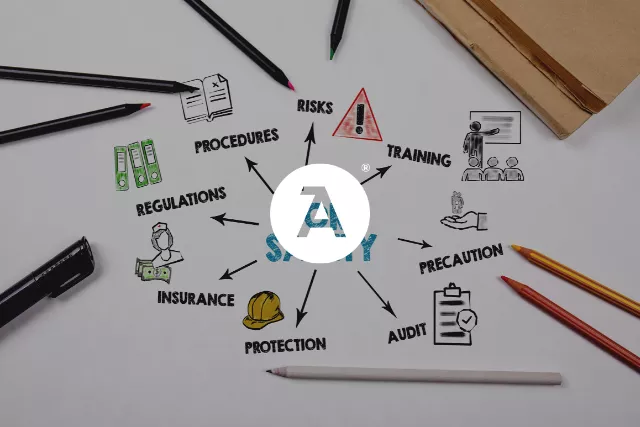How to Promote and Implement Workforce Safety During National Preparedness Month

No organization is insured against workplace violence. The cost of such incidents to organizations is astounding. It is impossible to overestimate workforce safety because a single incident can have far-reaching consequences: the loss of life or physical or psychological impact felt by the victim and the victim's family, friends, and coworkers; the decrease of productivity and morale that spans through an organization after an incident; and the damage to a business's reputation once the news is released to the public.
Workplace violence affects other aspects as well. The pervasive impact on organizations and individuals is wide-ranging and can include:
- Temporary/permanent absence of a skilled employee
- Psychological damage
- Property damage
- Productivity hindrances
- Increased security costs
- Increased workers' compensation costs
There are many theories about the causes of workplace violence. However, one needs to be very cautious when profiling or stereotyping individuals or organizations. The presence of any of the factors does not warrant a violent act. Nevertheless, an incident can be the result of any or a combination of these factors.
Remember – violence or threats of violence in any form is unacceptable workplace behavior. It should not be tolerated and must be addressed immediately.
Implementing strategies and step-by-step plans will ensure that your company is as prepared as possible. You need to take a look at the possible threats that could affect your staff, then make plans to eradicate them.
See below for several suggestions on integrating things such as disaster planning, workplace safety, and emergency preparedness at your organization.
What Is the Purpose of National Preparedness Month?
Since 2004, September has been deemed National Preparedness Month across the U.S. It's a time that people promote workplace safety and planning for the direst of circumstances.
By dedicating an entire month to preparedness, the Federal Emergency Management Agency is trying to drive the point home of how quickly things can turn. In those moments, it's important to have a plan of action.
Be sure to take this month of September seriously and put in several different plans for any emergency situation.
How to Promote Workforce Safety
It can be overwhelming to think of all the different scenarios that you need to prepare your organization for. The best way to prevent a workplace incident is to maintain a professional, healthy, and caring work environment with no place for negative feelings such as isolation, anger, and hostility among employees. Leaders should promote sincere, open, and timely communication among managers and employees and offer professional development opportunities.
Roles and Responsibilities
The Department of Labor Workplace Violence Program's goal is to promote a healthy work environment in which violent or potentially violent situations are proactively addressed and prevented. Employee awareness and understanding is key to the success of such a program.
Based on the aspects of the incident and the available resources, certain departmental experts may be asked to provide technical assistance in their particular field to help assess, investigate, and respond to emergency situations.
Employees (including managers and supervisors) are responsible for:
- Their own behavior by communicating responsibility with coworkers, leaders, and clients
- Being familiar with company policy regarding workplace violence
- Promptly sharing any potential acts of violence with appropriate authorities
- Cooperating in investigations and assessments of allegations of workplace violence
- Informing appropriate personnel about restraining or protective court orders related to domestic situations
The following steps for preparedness are integral to your workforce safety and your business's reputation.
Secure a Recovery Site or Alternative Workspace
When the safety of your workplace has been compromised, having access to an alternative workspace will ensure continuity of operations while protecting the safety of your workforce. Short and long-term alternative workspace should allow for all critical functions, which is why it's critical to have your alternative workspace secured beforehand. Waiting for an interruption to occur could result in significant delays in getting your recovery site fully functional to meet your recovery time objective.
If your team will recover remotely, consider a mobile power and secure connectivity solution that will allow them to safely work from anywhere without the threat of interruption. While it may be tempting to equip remote workers with a standard hotspot, beware of the cybersecurity challenges that come along with an unsecured network - especially given the sharp increase in cyberattacks on remote workers since 2020.
Implement an Emergency Communications Plan
One of the most critical aspects of your emergency preparedness is how you'll update your workforce that it's time to take action.
For these situations, an emergency notification system will allow you to communicate with everyone involved. Emergency notification software can be helpful when urgent instructions or guidance are being shared.
when possible, utilize a system that offers emergency notifications. It's a key part of ensuring that you can communicate with your staff as soon as a critical situation is identified.
Organize Your Plan Step by Step
The emergency plan that you put in place should be detailed and task oriented. Its organization is key in determining how successfully your business handles emergencies.
Start by thinking through the different steps of your plan. This can include items like evacuation plans for each department, emergency messages, how to report the emergency, shutdown procedures, and identifying possible emergencies.
As you plan each step, think of how it applies to your business. Where is the safest place to go for each different type of emergency? What's the next step after being notified of the emergency?
Train Your Employees
Designing a plan is not a strategy. You also need to train your staff on what to do when an emergency occurs. Go over the basics of your emergency training and ensure that they're familiar with all of your best practices for each situation.
Whether you're training tenants or employees, there's a likelihood that they don't process all of the critical information that you're giving them. For that reason, it's critical to train them more frequently.
The more training sessions you have, the more information they will process over time. They'll have a few takeaways from each session, helping them retain the instructions that you've given them.
You might also brainstorm different ways that you can make your training more interactive. Tabletop exercises are a great way to involve all essential employees who need to rehearse their plan of action during an emergency.
Identifying a Disgruntled Employee
To prevent an incident from happening, one must recognize the signs indicative of anger or hostility. If an employee demonstrates open aggression, owns weapons, or talks about resorting to violence as a solution, they may be a disgruntled employee. Although, the most prominent sign and the most dangerous type of disgruntled employee is one with criminal activity, especially when it pertains to violence.
Addressing Disgruntled Employees
You might think it will never happen to your business. However, in 2020 alone, workplace violence caused more than 20,000 injuries and nearly 400 fatalities. Disgruntled employees in your workplace should not be taken lightly. In fact, many workforce emergencies occur because the disgruntled employee didn't receive the help they needed.
Having a plan for workplace violence doesn't indicate that you don't trust your employees and coworkers. It means that your business cares about your colleagues' well-being and wants to protect them by implementing plans that will keep them safe in the worst-case scenarios.
Getting Ready for National Preparedness Month the Right Way
Take back control of any unforeseen situation with the right continuity and recovery strategy in place. Be sure to read this article for more information on how to identify a disgruntled employee in your workplace.
For more information about how to restore operations following a disruption, contact us or please visit our resources page today.



